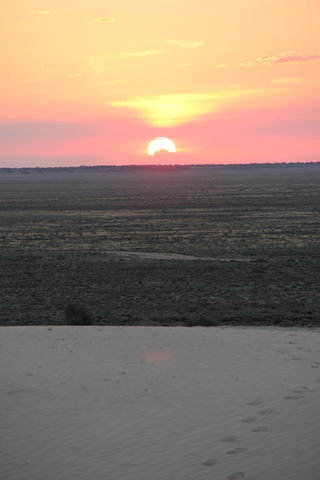In August 2011, Professor Ann McGrath started work on a three year ARC Discovery project which aims to forge innovative approaches to writing deep time history. With Research Associate Dr Malcolm Allbrook, Professor McGrath will examine the history of research in the internationally significant Willandra Lakes World Heritage Area in western New South Wales which, as well as Lake Mungo, includes other ancient and long dry lakes such as Arumpo, Leaghur, Garnpung and Mulurulu.

Professor Ann McGrath and Dr Malcolm Allbrook,
October 2011 (Photo by McGrath, ACIH)
It was at Lake Mungo in 1968 that a team of ANU scientists recovered the remains of an ancient woman who later became widely known as ‘Lady Mungo’. This and subsequent finds of human remains and cultural materials provided the first evidence of a human occupation of Australia of at least 50,000 years. Furthermore, there is evidence of strong continuities, persistence and flexibility by Aboriginal societies in the face of significant changes in environment and climate. These narratives support traditional knowledge about connections to sites and country which extend into the deep past.
More recently, traditional owners and scientific researchers have started to systematically share ideas, skills and knowledge and through this, respect for each other’s knowledge has grown. The project will examine the history of this relationship and the ways traditional and scientific knowledge systems have evolved from a state of mutual ignorance and mistrust, to the current state of support, understanding, and a commitment to work through problems and blockages as reflected in co-operative systems of land and research management.
The way these arrangements have come to enrich previously divergent belief and knowledge systems suggests story of reconciliation that may provide a model of global significance. The research team will collaborate with traditional owners and researchers, as well as National Park managers and pastoral landholders, to develop historical insights about their experiences, work and knowledge. Through this, they aim to extend historical understandings and narratives of how people might have lived in and adapted to changing environmental, social and political conditions in ‘deep time’, as well as in the more recent colonial past.

Lake Mungo from the lunettes, October 2011
(Photo by McGrath, ACIH)
Australian historiography has developed within a context which typically privileges the written record and, consequently, ‘Aboriginal history’ has focussed on the story of contact, adaptation and survival in the face of the severe disruptions to Indigenous life that accompanied colonisation. The long story of pre-colonial occupation of Australia has, in the absence of a written record, become the province of anthropology and archaeology, leaving Aboriginal people suspended within a long, seemingly unfathomable, and unchanging past.
This research project seeks to interrogate the problem of historicising this long pre-colonial history of the Australian continent by pooling the knowledge systems of historians and scientists with those of Aboriginal traditional owners and other regional land managers. By undertaking historical research on this internationally important site, it aims to tell a more inclusive story of Australia's national history, in order to enhance knowledge about Lake Mungo, and the history of Aboriginal occupation of the Australian landscape through the massive changes in climate, the natural and socio-political environments over time. The project outcomes will include publication of a monograph, scholarly papers and a community report which will lead to improved educational material for schools and the wider public.